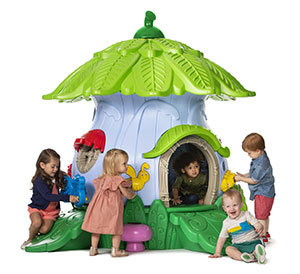30 Ways Play Builds Confidence in Children
“It is not about smart children, it is about happy children who have the confidence and courage to learn and pursue things dear to their heart.” ~ Alexandra Eidens
How do you boost a child’s self-esteem? This question chimes in the minds of parents, educators, and caregivers around the world. Self-esteem can have an incredibly profound influence on a person’s academic, professional, and personal success and overall happiness. A recent study conducted by the University of California, Davis found that “people with high self-esteem generally have more success at school and work, better social relationships, improved mental and physical health, and less anti-social behavior. And, these benefits persist from adolescence to adulthood and into old age.” That is why it is so important to protect and nurture a child’s self-esteem from the very beginning. Play is a wonderful, all-purpose ingredient in the recipe for confidence in children! The team at PlaygroundEquipment.com has delved into decades of child development research and gathered wisdom from early childhood experts to create this ultimate collection of ways that play builds confidence in children. Check it out:
Click to view the full-size infographic:
Embed this image on your site:
What age does self-esteem develop?
A child’s self-esteem begins developing very early and is impacted day by day. For example, when a baby receives loving attention and positive reactions, it helps cultivate a sense of safety, security, and acceptance which can blossom into long-term confidence. According to a paper published in the Psychological Bulletin (which was an analysis of 191 research articles on self-esteem including data from nearly 165,000 people), confidence first begins to rise between ages 4 and 11. During this time, children are developing socially and cognitively and establishing a sense of independence. Play, especially self-guided free play, is powerful confidence fuel as it empowers children to make their own choices, cultivate skills through trial and error, and discover what uniquely fulfills them. Confident kids are happy kids, and raising happy kids is an ultimate goal many of us share. It is no coincidence that the happiest children in the world are Dutch. Fundamental characteristics of Dutch parenting involve plenty of play and leisure time without hovering, trust and independence starting at a young age, outdoor recreation year round, negotiation, and emphasis on the importance of boundaries.
What are signs of low self-esteem in kids?
How can you tell if a child has low confidence? Every child is unique, so low self-esteem will manifest in individual ways. However, there are some common signs of low self-esteem to look out for such as:
- Avoiding tasks or challenges without trying
- Quitting soon after a game or task begins (indicates frustration)
- Signs of regression such as acting baby-like or exhibiting behaviors they outgrew
- Becoming controlling, demanding, or rigid (may be hiding feelings of powerlessness or inadequacy)
- Declining grades
- Loss of interest in usual activities
- Social withdrawing
- Sudden or rapid mood changes (sadness, angry outbursts, quietness, frustration)
- Making self-critical comments
- Difficulty accepting praise or criticism
- Inexplicable personality or behavior changes
It is never too late to help a child feel better about themselves. Below we have provided tips on raising confident children, but first, let’s talk about the power of play for a child’s self-esteem!
How Does Play Build Confidence?
How does play help self-esteem in children? Think about this: would you feel confident working at a job you have absolutely no experience in or playing a game you have never heard of without reading the rules? Play is how children experience the world, cultivate skills, practice what they have learned, discover their voices, and develop a sense of who they are. Without playful opportunities to engage with their surroundings and interact with peers and trusted adults, children may feel powerless and unimportant. Here are some wonderful articles on how play builds self-esteem in kids and why you should play with your child:
- The Power of Play: How Fun and Games Help Children Thrive – HealthyChildren.org
- How Play Helps Children’s Development – NI Direct
- Play That Helps Give ALL Kids the Confidence to Be Themselves – Melissa & Doug
- Benefits of Play – Voice of Play
- Confidence Through Play: Big Boost – NurseryWorld
- Parents’ and Caregivers’ Perspectives on the Benefits of High-Risk Outdoor Play Space – Journal of Outdoor and Environmental Education
- Spending Time in Nature Can Improve Children’s Confidence – University College London
- A Little Play Goes a Long Way: The Importance of Playing With Your Child – Utah State University
What else can we do to help our children have the confidence they need to be happy, healthy, and successful? Here are some excellent resources on how to build confidence in children:
- 12 Tips for Raising Confident Kids – Child Mind Institute
- 5 Ways to Build Your Preschooler’s Confidence – PBS for Parents
- Tips on Helping Your Child Develop Confidence – Zero to Three
- A Guide for Parents and Carers: Self-Esteem – Young Minds
- 11 Tips on Building Self-Esteem in Children – Today’s Parent
- 9 Ways to Boost Your Child’s Self-Esteem – KidsHealth
- Developing Self-Confidence From Birth to 12 Months – Zero to Three
- 5 Ways to Boost Your Child’s Confidence – On Our Sleeves
We hope you enjoyed our infographic on the importance of play for confidence in children. If you want to learn more about the link between play and child development, we have also created a guide to how play benefits brain development. The team here at Playground Equipment are steadfast advocates for the benefits of play and are dedicated to spreading the word on why play matters!
How Play Can Help Develop Confidence in Children
- "Play matters because it creates an opportunity to bring out the best in every kid, and it’s an
opportunity for kids to really see the best in themselves.”
~ Jill Vialet, founder of Playworks
- “As they master their world, play helps children develop new competencies that lead to enhanced confidence and the resiliency they will need to face future challenges.”
~ Kenneth R. Ginsburg, MD, MSEd
- “From the earliest days a child will grow in confidence and self-esteem by mastering new abilities through play.”
~ Dr. Richard Woolfson, child psychologist
- Play is deemed so essential for healthy development that the United Nations recognizes it as a human right for all children.
- “The longer children can enjoy play without the kind of monitoring that leads to self-criticism and self-doubt, the better.”
~ Dr. Craigan Usher
- Freedom and risk during play builds confidence as children make decisions, solve problems, build unique interests, and conquer challenges (all while having fun)!
- A child’s confidence will blossom if they feel you trust their play choices. It gives them the chance to conquer their fears, such as that colossal slide or wobbly tire swing. They will feel more in charge of their own lives and build their own brand of happiness.
- “Risky play is really important for kids—all kids—because it teaches hazard assessment, it teaches delayed gratification, it teaches resilience, it teaches confidence. When kids get outside and practice bravery, they learn valuable life lessons. ”
~ Caroline Paul
- A study of 70 six-year olds found that free play helped develop executive function skills.
“Children with higher executive function will be healthier, wealthier, and more socially stable throughout their lives.”
~ Ellen Wexler, Education Week
- A 2017 meta-analysis of 50 studies found strong evidence that exercise “is associated with decreased concurrent depressive symptoms”.
When kids feel good, they are more likely to try new things, which in turn fosters confidence.
- “Artistic engagement has cognitive benefits within kids. The concept of role-playing helps children develop positive cognitive characteristics, specifically a strong sense of confidence.”
~ Ronson Hawkins
- “Play relieves feelings of stress and boredom, connects us to people in a positive way, stimulates creative thinking and exploration, regulates our emotions, and boosts our ego.”
~ Association for Play Therapy
- “More time playing means more time engaging your imagination, actively exploring options and making choices while developing the resilience, independence, confidence and coping mechanisms needed to thrive in a constantly changing world.”
~ Rebecca Tortello
and Robert Jenkins, UNICEF
- “Pretend play empowers children to explore unfamiliar situations (going to the doctor/dentist, first day of school, flying on an airplane) and act out various scenarios. This helps them develop confidence as they learn to take risks, trust their instincts, and manage their responses to challenges.”
~ Melissa and Doug
- “Enriching a child’s risk literacy levels through failure, adversity, and hardship has the capacity to enhance self-esteem, cultivate an adventurous spirit, build resilience and tenacity, and, most importantly, is critical for lifelong learning.”
~ Journal of Outdoor and Environmental Education (2023)
- “Kids who play build their confidence and learn the social skills that help them become happy, well-adjusted adults.”
~ KaBOOM!
- “Play acts as a forward feed mechanism into courageous, creative, rigorous thinking in adulthood.”
~ Tina Bruce
- “In play a child always behaves beyond his average age, above his daily behavior. In play it is as though he were a head taller than himself. ”
~ Lev Vygotsky
- There is an abundance of research supporting a positive correlation between physical activity and
self-esteem, stress management, and overall life outlook. This is true for both children and adults. Movement is magical and if it’s fun, all the better!
- Professor Margaret Talbot, former president of the International Council for Sport Science and Physical Education, stated that dance, sports, and other challenging physical activities are distinctively powerful ways of helping children learn to ‘be themselves.’
- “Any time a child tries something new, it’s an opportunity for a self-confidence boost. Kids need to
take risks to build lasting confidence, and a playground allows them to take these risks in a safe, supervised environment.”
~ Little Tikes
- “Solving problems and coming up with creative solutions during a game or while working on a puzzle give children a sense of accomplishment and competence.”
~ UNICEF
- The American Academy of Pediatrics describes recess as a “necessary break in the day for optimizing a child’s social, emotional, physical, and cognitive development.”
- “Play helps children navigate complex social situations now and into adulthood. The new circuits the brain builds from play help create social agility.”
~ Cecilia Clark
- “We should be simply providing fields of free action for them to become, through playing, the resilient, adaptive, creative, emotionally intelligent, and socially confident young people that we all, in truth, want
them to be.”
~ Adrian Voce, OBE
- Canadian scientists discovered that 6th grade students who were more physically active had significantly higher self-esteem levels. These findings were corrobarated by another Canadian research team, who highlighted the impact of obesity on confidence and how exercise combats it.
- A meta-analysis of 22 studies examining the link between physical activity and mental health found that: “The strongest evidence was found for improvements in physical self-perceptions, which accompanied enhanced self-esteem in the majority of studies measuring these outcomes.”
- A Swiss study found that youths who were part of sports clubs had overall greater well-being and were less anxious, better socially adjusted, and generally happier with their lives and themselves.
- “Playtime is one of the best investments you can make in your child. The hours you spend playing with your children show them that they are valuable and worth your time.”
~ Liz Greene, Child Mind Institute
- “As children and adults get absorbed in the fun of playing, their spirits rise, their happy-meter goes up, and they experience an exhilaration that positively impacts both physical and emotional health.”
~ Chicago Children’s Museum
Sources:
- littletikescommercial.com
- publications.aap.org/pediatrics
- unicef.org
- extension.usu.edu
- melissaanddoug.com
- voiceofplay.org
- pbs.org
Learn about the author: Ben Thompson


